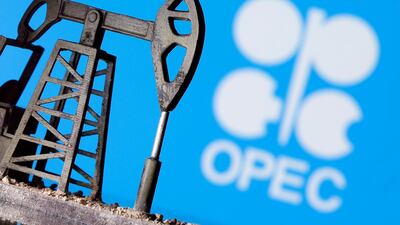Opec+, the alliance headed by Saudi Arabia and Russia, agreed to extend its biggest-ever production cuts for another month after a virtual meeting of its members on Saturday.
The 23-member alliance reiterated its commitment to curb 9.7 million barrels per day - cuts that were first agreed in April to offset the decline in demand caused by the coronavirus pandemic. Opec+ will now cut back at the same level until July, with producers who had not fulfilled their quota obligations pressed to compensate for that until September.
"The meeting therefore agreed unanimously to extend the first phase of the production adjustment agreed at the 10th extraordinary Opec and non-Opec ministerial meeting for a further month, to now run from May 1 to July 31, 2020,” Opec said in a statement on Saturday.
The Vienna-based group called on "all major oil producers to contribute proportionally to the stabilisation of the oil market”.
The alliance’s joint ministerial monitoring committee is expected to meet on July 18 and will convene on a monthly basis until December to oversee compliance. The next ordinary meeting of Opec is scheduled for 30 November in Vienna.
In his opening remarks, Algerian energy minister Mohamed Arkab, who also serves as Opec president, said the challenges for the group were “daunting” and said the producers could not afford to “rest on their laurels”.
The decision by Opec+ producers to bring forward the meeting June 6 from their earlier agreed dates of June 9 and 10 "will set the tone for the markets" when they reopen, said Ann-Louise Hittle, vice president, macro oils at Wood Mackenzie.
"The stakes are not as high as some fear. In our view, the fundamentals show even if the extra Opec+ cuts are not extended beyond June, the oil market is on its way to recovery," she said.
"Supply has shifted dramatically already, with total world supply on average for the second quarter down by a steep 6m bpd from the first quarter of 2020."
Brent, the international benchmark, settled at a three-month high of $42.30 on Friday, while West Texas Intermediate, the key US gauge closed at $39.55 per barrel.
The alliance agreed to the historic pact in April to cut nearly 10m bpd from the markets in May and June, with tapered cuts to remain in place until 2022.
Opec+ action has been instrumental in helping markets recover from a bleak April, which saw WTI plunge to -$40 per barrel amid low storage capacity and weak demand globally.
The coronavirus pandemic has battered demand for crude as countries imposed movement restrictions. Air transportation was grounded as populations were urged to work from home to limit the spread of the novel coronavirus outbreak.
US President Donald Trump thanked Saudi Arabia, Russia and the Opec+ group of producers on Friday for helping "save" the US energy industry, which has been decimated by the price slump.
"We had a disaster just a month ago ... we had a disaster with respect to energy. It [WTI] was down to zero, it was worthless and that’s 5 million jobs ... probably much more than that, indirectly probably close to 10 million jobs ... but we got Saudi Arabia and Russia and others to cut back substantially. Opec+ they were the leaders and we appreciate them very much," he said.
Compliance among the group averaged 86 per cent in May, according to Energy Intelligence, with West African producers cutting only half their allotted quotas.
Nigeria, a key West African producer, as well as Opec's second-largest producer Iraq, were singled out for lack of compliance, according to reports.
The Nigerian energy ministry said it would fully comply with Opec+ curbs and make up for the shortfall just ahead of the meeting.
Gulf members of the Opec+ alliance, led by Saudi Arabia, are cutting more than their quotas as they look to rebalance the markets sooner.
Saudi Arabia is cutting a further 1m bpd of supply from the markets in June, bringing its total output curbs to 4.8m bpd. The world's largest oil exporter is expected to produce around 7.492m bpd in June.
Kuwait is also drawing back an additional 80,000 bpd, while the UAE is committed to further reductions of 100,000 bpd.
Wood Mackenzie expects Opec crude production to decline almost 3m bpd from the first quarter to the second quarter as cuts enforced in May and June take effect.
Ms Hittle expects the cuts to ease to 7.7m bpd from July until December, with supply and demand expected to tighten in the third quarter.
"While some countries favour an extension until the end of the year and Russia wants to increase production quicker, I guess the compromise will be an extension of one to three months,” said Giovanni Staunovo, commodity analyst at UBS.
The Swiss bank remains cautious about the continuation of a price rally in the second quarter, noting that it “may prove self-defeating”.
UBS expects Brent to average $43 per barrel at the end of December and rise to $55 per barrel by mid-2021.
According to some media reports, core Gulf producers will end the additional voluntary commitments, as they seek to push repeat violators of the pact to do their part.


